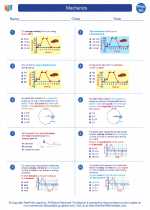Systems in Physics
In physics, a system is a collection of objects or phenomena that are being studied. These objects or phenomena are considered together as a single unit for the purpose of analysis. The interactions and relationships between the components of a system are of particular interest in physics.
Types of Systems
Systems in physics can be classified into different types based on their characteristics and behavior:
- Isolated System: An isolated system is one that does not exchange matter or energy with its surroundings. In other words, no external influences act on the system. The total momentum and energy of an isolated system are conserved.
- Closed System: A closed system allows the exchange of energy with its surroundings but does not allow the exchange of matter. The total momentum and energy of a closed system are conserved, but its internal energy may change.
- Open System: An open system allows the exchange of both matter and energy with its surroundings. The total momentum and energy of an open system may not be conserved due to the exchange with the surroundings.
Understanding Systems in Physics
When studying systems in physics, it is important to consider the following aspects:
- Boundary: The boundary of a system defines what is included in the system and what is external to it. Understanding the boundary helps in analyzing the interactions and exchanges between the system and its surroundings.
- Internal Interactions: The interactions between the components of a system play a crucial role in determining the behavior and properties of the system. These interactions can include forces, energy transfers, and other forms of communication between the components.
- External Influences: For open and closed systems, external influences from the surroundings can affect the behavior of the system. These influences may come in the form of external forces, energy transfers, or matter exchange.
Study Guide: Systems in Physics
To effectively study the concept of systems in physics, consider the following study guide:
- Understand the different types of systems - isolated, closed, and open - and their defining characteristics.
- Explore real-world examples of each type of system and analyze their behavior in terms of energy and momentum conservation.
- Practice identifying the boundary of a system and determining the interactions and exchanges that occur across the boundary.
- Investigate the concept of equilibrium within a system and how internal and external influences can affect the system's equilibrium state.
- Apply the principles of systems to solve problems involving energy transfer, momentum conservation, and thermodynamic processes.
By mastering the concept of systems in physics, you will develop a deeper understanding of the interconnected nature of objects and phenomena in the physical world, and how they can be analyzed as unified systems for scientific study.



